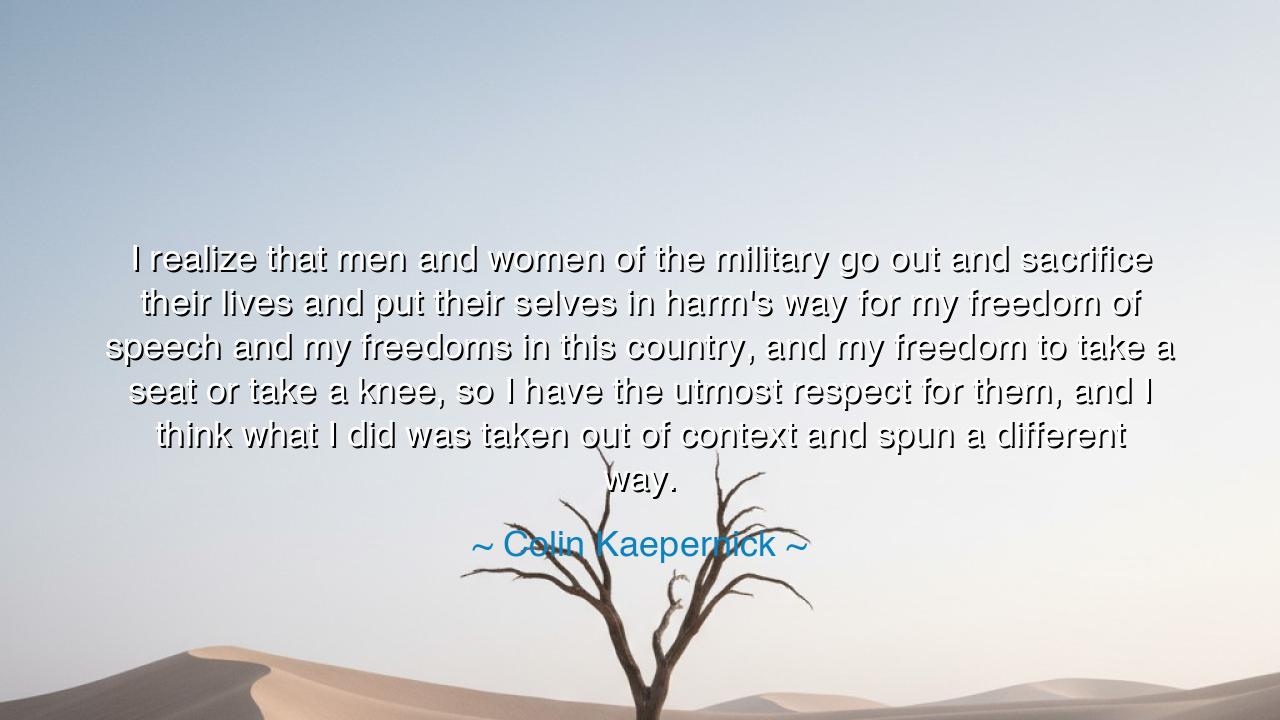
I realize that men and women of the military go out and sacrifice
I realize that men and women of the military go out and sacrifice their lives and put their selves in harm's way for my freedom of speech and my freedoms in this country, and my freedom to take a seat or take a knee, so I have the utmost respect for them, and I think what I did was taken out of context and spun a different way.






Hearken, O seekers of truth and guardians of conscience, to the words of Colin Kaepernick, who proclaimed: "I realize that men and women of the military go out and sacrifice their lives and put their selves in harm's way for my freedom of speech and my freedoms in this country, and my freedom to take a seat or take a knee, so I have the utmost respect for them, and I think what I did was taken out of context and spun a different way." Within these words lies a meditation on sacrifice, liberty, and moral courage, revealing the profound tension between gratitude for protection and the obligation to speak truth to power.
Since the dawn of civilization, societies have honored those who venture into danger to defend the liberties of others. The warrior, the soldier, the guardian of the realm, risk life itself so that the citizen may act, speak, and live without fear. Kaepernick’s acknowledgment of their sacrifice reflects a deep understanding of freedom’s cost, yet his act—the kneeling, the silent protest—reveals another ancient truth: liberty is not merely to be received but exercised responsibly and conscientiously.
Consider the tale of Socrates in the Athenian polis, who, though granted the freedoms of a citizen, chose to question, to challenge, and to speak against injustice. His commitment to truth, though uncomfortable to many, exemplified the tension between gratitude for civic protection and the moral imperative to critique societal wrongs. Kaepernick’s gesture, like Socrates’ dialogue, embodies the courage to use freedom not only for comfort but for conscience, even at personal cost.
The controversy surrounding his action reminds us that context is fragile and meaning malleable. Ancient historians warned that deeds, like words, could be twisted by rumor, misinterpretation, or fear. Yet Kaepernick’s reflection underscores the virtue of intentionality: the act of taking a knee was not a denigration of the military, but a protest against systemic injustice, a plea for accountability, and an invocation of the very freedoms his protectors secure. It is the essence of moral courage: to act with conscience even when misunderstood.
In history, we find parallel acts of reverence and dissent. Martin Luther King Jr., for example, honored the legal and civic structures of the nation while courageously challenging their failures, marching for civil rights in ways that were often contested and controversial. His courage did not diminish respect for those who uphold law and order; rather, it demanded that justice be more fully realized. Kaepernick walks a similar path, balancing respect for sacrifice with the imperative to awaken conscience.
The lesson here is profound: freedom is sacred not only for its protections but for its responsibilities. To speak, to protest, and to act in alignment with conscience honors the very liberties defended by others. Kaepernick teaches that one can hold gratitude for service while exercising moral voice, and that misunderstanding by others does not dilute the truth or the virtue of principled action.
Practical action flows from this wisdom: cultivate awareness of the freedoms you enjoy, honor those who safeguard them, and use your voice and actions to advocate for justice and equity. When facing controversy, hold steadfast to your intentions, clarify your purpose, and act with both courage and humility. Recognize that liberty demands vigilance and conscience as companions.
O seeker of understanding, remember this: the weight of freedom is borne on the shoulders of the brave, yet its exercise rests in the conscience of the citizen. Let the words of Colin Kaepernick resonate within your soul, guiding you to act with courage, honor, and wisdom. Kneel not to fear, nor stand idle in comfort, but engage in the sacred duty to uphold justice, embodying the balance of respect and conscience that sustains the vitality of a free people.
I can also craft a version designed for oral narration, with rhythmic rises, pauses, and emphases, giving it the cadence of an ancient moral teaching. Would you like me to do that?






AAdministratorAdministrator
Welcome, honored guests. Please leave a comment, we will respond soon